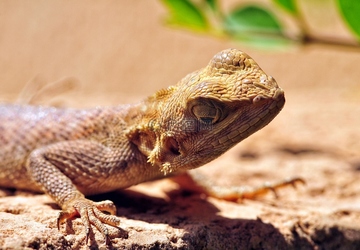Over the years, many myths have circulated about reptile care, resulting in mistreatment of these creatures. Unfortunately, these rumors have misled so many people that reptiles do not get the healthy lifestyle they deserve. Some misconceptions in this article are misspelled so that current reptile owners can ensure they treat their reptiles with the sensitivity they deserve.
Myths about keeping reptiles as pets
Reptiles are cold-blooded, scaly vertebrates. Breeding these creatures as Persians in the world has become the norm in recent years. However, certain myths about keeping reptiles undermine their care. Read this article to learn how to care for reptiles (if you own one).
1. Reptiles are dangerous
Reptiles have grown in popularity as dangerous creatures due to the spread of salmonella half a century ago. Since turtles swim in unclean environments, it's not fair to blame the reptiles entirely. Poor sanitation is responsible for 5 out of every 200 cases of Salmonella in reptiles. However, the remaining Salmonella cases were diet-related. Humans can contract diseases like salmonella for other reasons, so it's a myth that reptiles are dangerous. Like any other animal, they can have bacteria, parasites, and viruses, but that doesn't mean they're not worth it. Salmonella does exist, but proper precautions must be taken to prevent the spread of the disease.

2. You don’t need a complex diet
There is a misconception among reptile owners that they are content to eat insects or mice. In fact, reptiles lack many nutrients, scents, and textures. Their diet is complex, requiring far more than what they can get from these insects. Another mistake reptile breeders make is feeding reptiles calcium supplements to optimize their metabolic processes. This is an aggressive approach, since overfeeding calcium is not advisable. They need to be fed strategically.
3. Reptiles do not seek environmental enrichment
Reptiles respond to environmental enrichments when exposed to them. They are not as expressive as mammals, but do show awareness of their surroundings. Various hiding places and climbing opportunities can stimulate their instincts. They are also playful and love to chase objects and move around. When a reptile has the basics down, it's sure to appreciate the resemblance to its natural habitat.
4. Reptiles require less maintenance
They're different from mammals, but that doesn't mean they don't seek care. They need affection just like any other pet, so the owner should take good care of them. They also need a home with the right temperature and humidity in order to survive. Additionally, they can develop serious health problems if hygiene is not maintained.
5. Reptiles don’t go to the vet
Veterinary care is professional medical care for animals. Since reptiles express their feelings through unwilling ailments, symptoms may not be recognized when viewed. Like any other animal, the potential for disease makes regular visits to the veterinarian important for reptiles. It is needed for nutritional advice, injury, immunization prescriptions, or diagnosis of other health problems. Regular checkups ensure your reptile's health and longevity. So avoid the stereotype that reptiles don't need veterinary care, and seek medical help when needed.
6. Reptiles have no feelings for their owners

It is completely untrue to say that reptiles have no feelings for their owners. It takes time to bond with reptiles because they are conservative. When cared for tenderly, they will show signs of bonding. Symptoms of caregiver love may include happy touching or closing eyes when being held. Some reptiles are more enthusiastic than others when it comes to superiors. You can follow and approach them. Others may even feel uncomfortable when the owner is away for long periods of time. However, anyone who keeps reptiles as pets should not be afraid to be friendly with them.
7. Reptiles don’t need bigger rooms
For animals, being able to move freely in their habitat is also a life of freedom. So instead of keeping reptiles in smaller enclosures, provide them with plenty of space. This way they will be exercising, feeling good and happy. Confining them to a small space can cause them distress and possible health problems.
8. All reptile supplements are more or less the same
This myth needs to be debunked. Each reptile has different nutritional needs depending on its species, size and age. The reptiles are given supplements to provide specific nutrients they lack. Some may need calcium and vitamin D3, while others need vitamin A. Therefore, each reptile should be given the food it should eat by agreement.
9. Reptiles are short-lived and alive
A reptile's lifespan depends on how well it is managed. Their nature, instincts and social behavior must be observed in order to provide them with the right environment. Some tortoises, such as the Galaga Persian, can live for centuries, while some snakes can live for more than 50 years. Other snakes, such as ball pythons, can live for decades if conditions are right. Smaller Animals: Skinks or geckos can live for five to ten years. Let's be honest, reptiles have short and long lifespans. It just depends on the type and lifestyle of the species.
10. Reptiles are cheap animals
Reptiles can be cheap to buy, but very expensive to run. The cost of building an enclosure with toys and a jungle gym. Regular visits to the vet for checkups, huge dietary preferences and need for supplements. All of this makes reptiles expensive pets.
Conclusion
In conclusion, a lot of reptile fiction is misspelled. They deserve the same recognition and understanding as other animals. Their unique qualities make them beautiful. Contrary to this belief, they are able to bond with humans, so they should not be isolated. Based on what we learn in this article, there is a need to increase awareness of these species. Educate yourself and embrace the ecosystem around you.